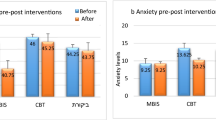Abstract
Severe health anxiety (HA), or hypochondriasis, afflicts up to 5 % of the general population, and is associated with high levels of distress, disability, and health care utilization. While cognitive behavioral therapy has been found to be an effective treatment, the results of studies are often mixed, and many patients choose not to participate, or do not recover. There is a strong theoretical basis supporting the use of mindfulness-based cognitive therapy (MBCT) based on its putative effects on many of the core mechanisms of HA. MBCT has been modified to address these maintaining mechanisms. Evidence from qualitative and quantitative research, including an open-label trial and a randomized control trial, suggests that the approach is acceptable and effective, and this appears to be mediated by theory-consistent mechanisms. There is still a relative paucity of research in this area, but the existing data supports the consideration of MBCT as an alternative to CBT.
Access this chapter
Tax calculation will be finalised at checkout
Purchases are for personal use only
Similar content being viewed by others
References
Creed F, Barsky AJ. A systematic review of the epidemiology of somatization disorder and hypochondriasis. J Psychosom Res. 2004;56:391–408.
Gureje O, Üstün TB, Simon GE. The syndrome of hypochondriasis: a cross-national study in primary care. Psychol Med. 1997;27(05):1001–10.
Barsky AJ, Ettner SL, Horsky J, Bates DW. Resource utilization of patients with hypochondriacal health anxiety and somatization. Med Care. 2001;39(7):705–15.
Mykletun A, Heradstveit O, Eriksen K, Glozier N, Øverland S, Mæland JG, et al. Health anxiety and disability pension award: The HUSK Study. Psychosom Med. 2009;71(3):353–60.
Olde Hartman TC, Borghuis MS, Lucassen PL, van de Laar FA, Speckens AE, van Weel C. Medically unexplained symptoms, somatisation disorder and hypochondriasis: course and prognosis. A systematic review. J Psychosom Res. 2009;66(5):363–77.
Warwick HM, Salkovskis PM. Hypochondriasis. Behav Res Ther. 1990;28(2):105–17.
Barsky AJ, Ahern DK. Cognitive behavior therapy for hypochondriasis: a randomized controlled trial. JAMA. 2004;291(12):1464–70.
Visser S, Bouman TK. The treatment of hypochondriasis: exposure plus response prevention vs cognitive therapy. Behav Res Ther. 2001;39:423–42.
Thomson AB, Page LA. Psychotherapies for hypochondriasis. The Cochrane database of systematic reviews. 2007;17(4):CD006520.
Williams MJ, McManus F, Muse K, Williams JMG. Mindfulness‐based cognitive therapy for severe health anxiety (hypochondriasis): an interpretative phenomenological analysis of patients’ experiences. Br J Clin Psychol. 2011;50(4):379–97.
van der Velden AM, Kuyken W, Wattar U, Crane C, Pallesen KJ, Dahlgaard J, et al. A systematic review of mechanisms of change in mindfulness-based cognitive therapy in the treatment of recurrent major depressive disorder. Clin Psychol Rev. 2015;37:26–39.
Fergus TA. I really believe i suffer from a health problem: examining an association between cognitive fusion and healthy anxiety. J Clin Psychol. 2015;71(9):920–34.
Tang YY, Hölzel BK, Posner MI. The neuroscience of mindfulness meditation. Nat Rev Neurosci. 2015;16(4):213–25.
Farb NA, Anderson AK, Segal ZV. The mindful brain and emotion regulation in mood disorders. Can J Psychiatry. 2012;57(2):70.
Haase L, Thom NJ, Shukla A, Davenport PW, Simmons AN, Paulus MP et al. Mindfulness-based training attenuates insula response to an aversive interoceptive challenge. Soc Cognit Affect Neurosci. 2014;nsu042.
Goyal M, Singh S, Sibinga EM, Gould NF, Rowland-Seymour A, Sharma R, et al. Meditation programs for psychological stress and well-being: a systematic review and meta-analysis. JAMA Intern Med. 2014;174(3):357–68.
Jensen MP, Day MA, Miró J. Neuromodulatory treatments for chronic pain: efficacy and mechanisms. Nat Rev Neurol. 2014;10(3):167–78.
Delgado-Pastor LC, Ciria LF, Blanca B, Mata JL, Vera MN, Vila J. Dissociation between the cognitive and interoceptive components of mindfulness in the treatment of chronic worry. J Behav Ther Exp Psychiatry. 2015;48:192–9.
Marcus DK, Hughes KT, Arnau RC. Health anxiety, rumination, and negative affect: a mediational analysis. J Psychosom Res. 2008;64(5):495–501.
Hawley LL, Schwartz D, Bieling PJ, Irving J, Corcoran K, Farb NAS, et al. Mindfulness practice, rumination and clinical outcome in mindfulness-based treatment. Cogn Ther Res. 2014;38(1):1–9.
Bardeen JR, Tull MT, Stevens EN, Gratz KL. Exploring the relationship between positive and negative emotional avoidance and anxiety symptom severity: the moderating role of attentional control. J Behav Ther Exp Psychiatry. 2014;45(3):415–20.
Wheaton MG, Berman NC, Abramowitz JS. The contribution of experiential avoidance and anxiety sensitivity in the prediction of health anxiety. J Cogn Psychother. 2010;24(3):229–39.
Bardeen JR, Fergus TA, Orcutt HK. The moderating role of experiential avoidance in the prospective relationship between anxiety sensitivity and anxiety. Cogn Ther Res. 2014;38(4):465–71.
Surawy C, McManus F, Muse K, Williams JMG. Mindfulness-Based Cognitive Therapy (MBCT) for health anxiety (Hypochondriasis): rationale, implementation and case illustration. Mindfulness. 2014;6(2):382–92.
Kurdyak P, Newman A, Segal Z. Impact of mindfulness-based cognitive therapy on health care utilization: a population-based controlled comparison. J Psychosom Res. 2014;77(2):85–9.
Segal ZV, Williams JMG, Teasdale JD. Mindfulness-based cognitive therapy for depression: a new approach to relapse prevention. New York: Guilford; 2002.
Kabat-Zinn J. Full catastrophe living. New York, NY: Delta; 1990.
Lovas DA, Barsky AJ. Mindfulness-based cognitive therapy for hypochondriasis, or severe health anxiety: a pilot study. J Anxiety Disord. 2010;24(8):931–5.
McManus F, Surawy C, Muse K, Vazquez-Montes M, Williams JMG. A randomized clinical trial of mindfulness-based cognitive therapy versus unrestricted services for health anxiety (hypochondriasis). J Consult Clin Psychol. 2012;80(5):817.
Noyes Jr R, Stuart SP, Langbehn DR, Happel RL, Longley SL, Muller BA, et al. Test of an interpersonal model of hypochondriasis. Psychosom Med. 2003;65(2):292–300.
McManus F, Muse K, Surawy C, Hackmann A, Williams JM. Relating Differently to Intrusive Images: the Impact of Mindfulness-Based Cognitive Therapy (MBCT) on Intrusive Images in Patients with Severe Health Anxiety (Hypochondriasis). Mindfulness. 2015 Aug 1;6(4):788–96.
Author information
Authors and Affiliations
Corresponding author
Editor information
Editors and Affiliations
Rights and permissions
Copyright information
© 2016 Springer International Publishing Switzerland
About this chapter
Cite this chapter
Lovas, D.A. (2016). Mindfulness-Based Cognitive Therapy for Severe Health Anxiety or Hypochondriasis. In: Eisendrath, S. (eds) Mindfulness-Based Cognitive Therapy. Springer, Cham. https://doi.org/10.1007/978-3-319-29866-5_9
Download citation
DOI: https://doi.org/10.1007/978-3-319-29866-5_9
Published:
Publisher Name: Springer, Cham
Print ISBN: 978-3-319-29864-1
Online ISBN: 978-3-319-29866-5
eBook Packages: MedicineMedicine (R0)




